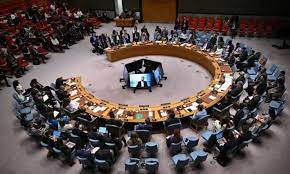The Security Council Condemns Violence in Sweida: An Analysis of Positions and Implications

One of the main points of the statement was the affirmation of Syria's sovereignty, as the council called on all countries to respect the unity of Syrian territory and not to interfere in its affairs. It also condemned "destructive foreign interventions," implicitly referring to the Israeli strikes targeting Sweida under the pretext of "protecting the Druze."
It called for an end to the violence and the protection of civilians, and welcomed the statement from the interim Syrian government that condemned the violence and promised an investigation. It insisted on the demand for "swift and impartial" investigations according to international standards.
It focused on the humanitarian crisis and demanded the guarantee of unhindered access to humanitarian aid. It warned of the worsening displacement, especially with the ongoing clashes between Sweida factions and Bedouin tribes.
It also called for a Syrian-led political process that preserves the rights of all components. It linked stability in Syria to political and security transition.
The statement did not explicitly mention Israel, but the condemnation of "foreign interventions" comes in the context of the intensified Israeli airstrikes on Sweida, which have exacerbated the crisis. This shows an international trend to contain Israeli escalation, especially after accusations that Tel Aviv is exploiting the events to destabilize the region.
The council also welcomed the statement from the transitional government, which enhances its international legitimacy, despite not being fully recognized by all members, showing a subtle division among members:
Western countries (the United States, France, and Britain) want greater pressure on Israel. Meanwhile, Russia and China focus on "Syria's sovereignty" without directly criticizing Israel.
The statement did not adopt a binding resolution, which weakens its impact. Thus, Israel may ignore the statement if it considers it non-binding, and the Syrian government will face a test of its ability to impose security in Sweida. The international community demands practical steps, such as increasing humanitarian support.
And pressure to stop foreign military interventions.
The Security Council statement is considered a diplomatic warning, but it remains insufficient to stop the violence without concrete measures. Sweida may be a testing point for Syria's future: either slipping into broader chaos or the beginning of temporary stability if local and international parties commit to stopping interventions.